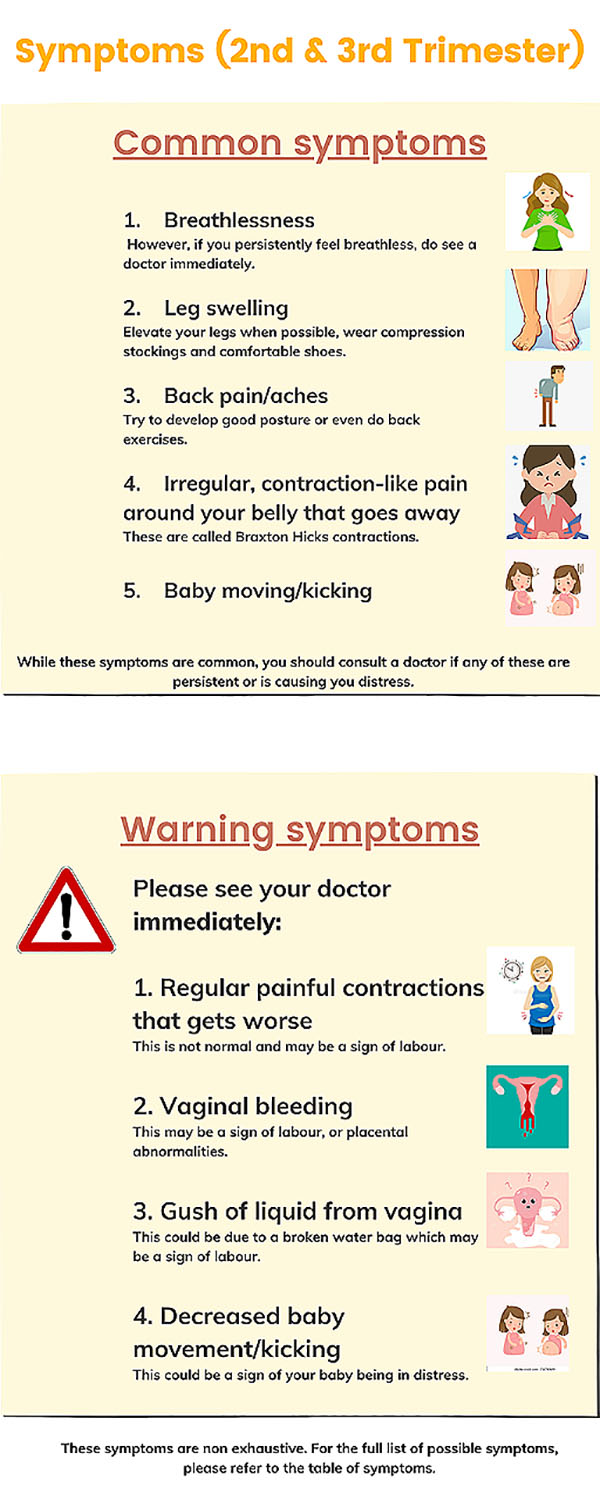
Symptoms in the Third Trimester of Pregnancy
The third trimester of pregnancy is the final stretch, and it can be a time of both excitement and discomfort. As your body prepares for labor and delivery, you may experience a variety of symptoms. Some of these symptoms are common, while others are less so. It is important to be aware of the symptoms of the third trimester so that you can manage them effectively and enjoy this special time.
Common Symptoms
- Abdominal pain: As your uterus grows, it can put pressure on your abdomen, causing pain. This pain is usually mild and intermittent, but it can be more severe if you have a large baby or if you are carrying multiples.
- Back pain: The extra weight of your belly can put strain on your back, causing pain. This pain is usually worse in the lower back, but it can also radiate to the upper back and neck.
- Constipation: The hormones of pregnancy can slow down your digestion, causing constipation. This can be uncomfortable and can lead to hemorrhoids.
- Frequent urination: As your uterus grows, it can put pressure on your bladder, causing you to urinate more frequently. This can be especially bothersome at night.
- Heartburn: The hormones of pregnancy can relax the valve between your stomach and esophagus, allowing stomach acid to flow back into your esophagus. This can cause heartburn, which is a burning sensation in the chest.
- Hemorrhoids: Hemorrhoids are swollen veins in the rectum. They can be caused by the increased pressure on the veins in your pelvis during pregnancy. Hemorrhoids can be painful and itchy.
- Leg cramps: Leg cramps are common in the third trimester. They are caused by the increased pressure on the nerves in your legs. Leg cramps can be painful and can disrupt your sleep.
- Nasal congestion: The hormones of pregnancy can cause your nasal passages to swell, leading to nasal congestion. This can make it difficult to breathe and can lead to sinus infections.
- Shortness of breath: As your uterus grows, it can push up against your diaphragm, making it difficult to breathe. This shortness of breath is usually worse when you are lying down.
- Swelling: Swelling in the hands, feet, and ankles is common in the third trimester. This swelling is caused by the increased fluid retention that occurs during pregnancy.
- Varicose veins: Varicose veins are swollen, twisted veins that can occur in the legs and vulva during pregnancy. They are caused by the increased pressure on the veins in your pelvis. Varicose veins can be painful and unsightly.
Less Common Symptoms
- Blurred vision: Blurred vision can be a sign of preeclampsia, a serious condition that can occur during pregnancy. Preeclampsia is characterized by high blood pressure and protein in the urine.
- Dizziness: Dizziness can be a sign of anemia, a condition that occurs when you do not have enough red blood cells. Anemia can be caused by a number of factors, including iron deficiency.
- Headaches: Headaches are common in the third trimester. They can be caused by a variety of factors, including stress, fatigue, and dehydration.
- Insomnia: Insomnia is difficulty falling or staying asleep. It is common in the third trimester due to the physical and emotional changes that are occurring.
- Mood swings: Mood swings are common in the third trimester. They can be caused by the hormonal changes that are occurring.
- Nausea and vomiting: Nausea and vomiting can occur in the third trimester, although it is less common than in the first trimester.
- Painful urination: Painful urination can be a sign of a urinary tract infection (UTI). UTIs are common in pregnancy due to the increased pressure on the bladder.
- Vaginal bleeding: Vaginal bleeding is not normal in the third trimester. It can be a sign of a serious condition, such as placental abruption or placenta previa.
When to Call Your Doctor
It is important to call your doctor if you experience any of the following symptoms:
- Blurred vision
- Dizziness
- Headaches that are severe or do not go away
- Insomnia that is severe or interferes with your daily life
- Mood swings that are severe or interfere with your relationships
- Nausea and vomiting that is severe or does not go away
- Painful urination
- Vaginal bleeding
These symptoms can be signs of a serious condition, and it is important to get medical attention right away.
Managing Symptoms
There are a number of things you can do to manage the symptoms of the third trimester:
- Get regular exercise: Exercise can help to reduce back pain, constipation, and swelling. It can also improve your mood and energy levels.
- Eat a healthy diet: Eating a healthy diet can help to reduce constipation and heartburn. It can also provide you with the nutrients that you need for a healthy pregnancy.
- Get enough sleep: Getting enough sleep can help to reduce fatigue, mood swings, and insomnia.
- Manage stress: Stress can worsen many of the symptoms of pregnancy. Find healthy ways to manage stress, such as exercise, yoga, or meditation.
- Talk to your doctor: If you are experiencing any symptoms that are severe or do not go away, talk to your doctor. There may be treatments available to help you manage your symptoms.
The third trimester of pregnancy can be a challenging time, but it is also a time of great joy and anticipation. By being aware of the symptoms of the third trimester and by managing them effectively, you can enjoy this special time and prepare for the arrival of your baby.